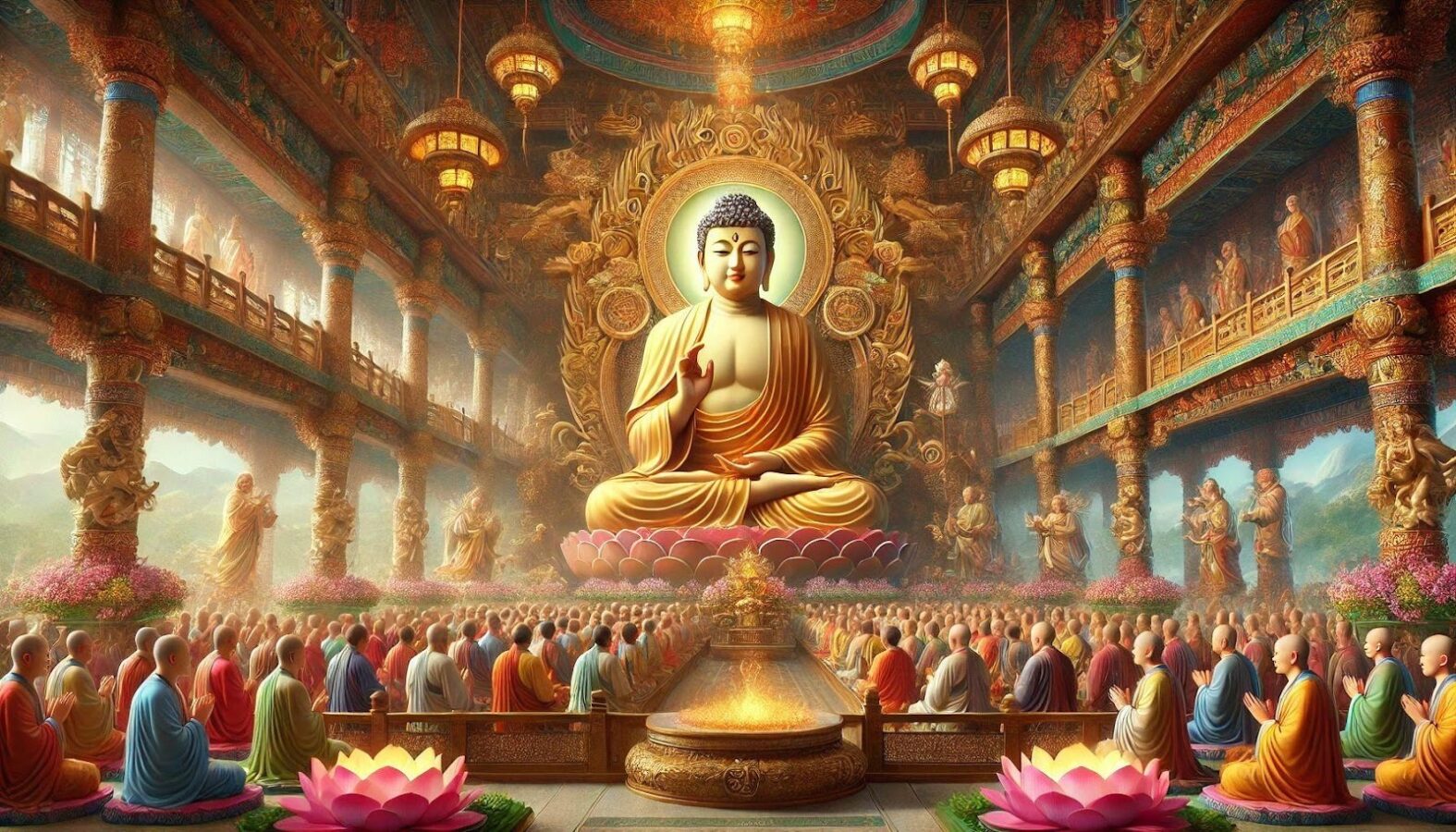
Date: 03/22/2025 03/23/2025
Location: Star Lake Meditation Center
Teacher: Shilin Long
Dharma Talk
The Reckless Dhananīka
Once upon a time, there was a man named Dhananīka. He came from a poor household, often suffering from hunger and lacking proper clothing.
One autumn, he harvested some paddy from his field. However, due to his poverty, he could not afford an ox to thresh the grain. Therefore, he borrowed an ox from a familiar villager in the neighboring village. After finishing the threshing, he was ready to return the ox.
When he brought the ox back to his neighbor’s house, he saw that the owner was busy, so he did not greet him. Instead, he simply tied the ox to a tree beside the door and left.
The owner of the ox saw him bringing the ox back, but assumed that he still needed to use it, so he did not inquire further or take the ox back into his house.
As a result, the ox went missing!
A few days later, when the owner saw that Dhananīka had not returned the ox, he went to demand it back.
Dhananīka said, “I already returned the ox.” The two of them then argued fiercely.
Enraged that Dhananīka refused to return the ox, the owner dragged him to see the king to settle the dispute.
On their way, they saw a man chasing an escaped horse.
The stableman, seeing people approaching, shouted loudly, “Stop it! Help me stop the horse!”
Just then, there was a stone by the roadside. Dhananīka picked it up and threw it, hitting the horse’s leg.
The stone landed right on the horse’s leg, breaking it instantly.
It turned out that this horse had escaped from the king’s stables. The stableman, seeing this situation, was terrified and feared that the king would punish him. So, he grabbed Dhananīka and took him to see the king.
Now, the three of them continued down the road and came to a river but did not know where the ferry crossing was.
At that moment, they saw a carpenter holding his tools in one hand and his clothes in the other, with only a hatchet left, which he held in his mouth while carefully wading through the river.
Dhananīka asked, “Sir, is the water deep? Can we wade across it?”
The carpenter replied, “Yes, you can!”
But as soon as he opened his mouth, the hatchet fell into the water.
The carpenter was furious and grabbed Dhananīka, insisting that he compensate for the lost hatchet.
Now, there were four of them proceeding together. Dhananīka, now hungry, thirsty, and exhausted, was feeling increasingly frustrated.
Suddenly, he noticed a wall ahead and thought, “This is my chance! If I jump over the wall, I can escape!”
With a quick struggle, he broke free from the others, dashed like a rabbit, climbed onto the wall, and leaped over it.
However, on the other side of the wall, there was an old weaver and his son resting beneath it.
As Dhananīka jumped over, he landed directly on the old weaver, his feet pressing against the man’s chest.
The old weaver, unable to breathe, tilted his head and died instantly.
The weaver’s son, seeing his father trampled to death, was furious and beat Dhananīka severely. Just then, the ox owner, stableman, and carpenter all arrived. They all seized Dhananīka and marched him toward the palace to see the king.
As they walked, they saw a tree with a parrot perched on it.
Seeing them pass by, the parrot asked, “Dhananīka, Dhananīka, where are you going?”
Dhananīka recounted his series of misfortunes one by one and told the parrot, “They are taking me to see the king.”
The parrot said, “I have heard that the king is very wise. Since you are going to see him, could you ask him something for me? I have noticed that when I call from other trees, my voice is not as melodious as when I sing from this tree. Could you ask the king why that is?”
Dhananīka agreed.
After walking for a while, they saw a hole in the ground, and at its entrance was a venomous snake.
Seeing them approach, the snake asked, “Dhananīka, where are you going?”
Dhananīka once again recounted his misfortunes and said, “They are taking me to see the king.”
The snake said, “Please ask the wise king something for me. Every morning when I leave my hole, my body is soft and moves easily. But every evening when I return, my body becomes stiff and painful, making it difficult to enter my hole. Could you ask the king why this happens?”
Dhananīka agreed.
Thus, Dhananīka was escorted to the palace by the ox owner, stableman, carpenter, and weaver’s son.
The ox owner first presented his case to the king, saying, “This man borrowed my ox, but when I went to retrieve it, he refused to return it.”
The king asked Dhananīka, “Why did you borrow the ox and not return it?”
Dhananīka explained, “Because of my poverty, I had no way to thresh my harvested rice, so I borrowed an ox from him. After using it, I returned it to his house. He even saw me bringing it back, but since I did not explicitly inform him, the ox was left tied at his door, and I returned home empty-handed. I did not know that the ox would go missing.”
The king asked the ox owner, “Is this true?”
The ox owner admitted, “Yes, that is correct.”
The king then declared, “Both of you are at fault. Dhananīka should have verbally informed the owner, and the ox owner, seeing the ox returned, should have secured it properly. Now, I shall pass judgment—since Dhananīka remained silent while returning the ox, his tongue should be cut out! And since the ox owner saw the ox but did not take care of it, his eyes should be gouged out!”
The ox owner, terrified, pleaded, “No, no, Your Majesty! I will forgo the ox! Please do not cut out his tongue, and do not gouge out my eyes. Let us settle this matter ourselves!”
The king said, “If you both agree to a settlement, that is best. This case is now closed.”
The story continues with similar judgments and settlements regarding the horse’s broken leg, the lost hatchet, and the weaver’s accidental death, all handled by the king’s wisdom and fairness.
Finally, Dhananīka, who was destined to become Venerable Piṇḍola Bhāradvāja, was granted a hidden treasure beneath the tree, which he used to build a prosperous life.
The wise king was none other than the past life of Śākyamuni Buddha.

